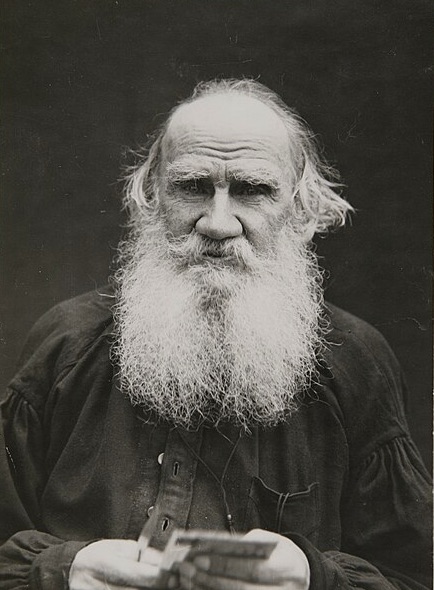
Lev Nikolayevich Tolstoy, known today as Leo Tolstoy was born on September 9, 1828. in Tula Province, Russia, into an aristocratic family. His mother died when he was two and his father seven years later, rendering Tolstoy and his siblings as orphans who were raised by relatives.
In 1844, Leo entered Kazan University to study law and Asian languages. However, his teachers judged him to be a reluctant learner and an incapable student, so no one was surprised when Tolstoy dropped out of the university and returned home. During his late teenage years, he embarked on writing a novel based on personal experiences from on his early life. This work, titled, Childhood was published in 1852.
During the time that he was writing his first novel, Leo had been accumulating significant gambling debts and In 1851, he joined the Russian army to fight in the Crimean War. This brutal conflict, highlighted in Tennyson’s poem Charge of the Light Brigade, was the theatre in which Florence Nightingale attended relentlessly to those suffering from typhoid and cholera. In his role as an artillery officer Tolstoy fought in the Battle of Chernaya during the siege of Sevastopol and earned a reputation for his courage. In spite of this reputation and his subsequent promotion to lieutenant, Tolstoy’s observation of the devastation and human carnage of war made a dramatic impression on him and would be later reflected in his novels.
The Crimean war ended in March 1856 with the surrender of the Russian army and the signing of the Treaty of Paris, The following year, Tolstoy left the army and embarked on travel throughout Europe. While in Paris, he witnessed a public execution that prompted him to write in a letter to a friend, “The truth is that the State is a conspiracy designed not only to exploit, but above all to corrupt its citizens … Henceforth, I shall never serve any government anywhere.” His epic novel War and Peace, published in 1869 is perhaps, his most famous work. It is a sprawling narrative set against the backdrop of the Napoleonic Wars and explores themes of history, society, and human nature. (Contrary to Elaine’s assertion in a satirical episode of theSeinfeld sitcom, the original title was not “War, what is it good for?”)
By 1878, Tolstoy had been married to Sophia Behrs for 16 years–a union that would ultimately yield 13 children. His family life and the challenges he faced in his marriage are reflected in his renowned novel, Anna Karenina, that explores themes of love, infidelity, and the consequences of societal norms.
Throughout his middle age, Tolstoy underwent a profound spiritual and philosophical transformation that led him to reject his earlier aristocratic lifestyle and embrace a philosophy of Christian anarchism and pacifism. His beliefs are reflected in his philosophical works, such as The Kingdom of God Is Within You. His writings and philosophy inspired the Tolstoyan movement, that advocated for nonviolence, simple living, and social reform.
In his later years, Tolstoy lived on his estate at Yasnaya Polyana, where he carried out experiments in farming and education based on his philosophy of simple living. He died of pneumonia on November 20, 1910, at the age of 82. His death marked the end of an era in Russian literature.
